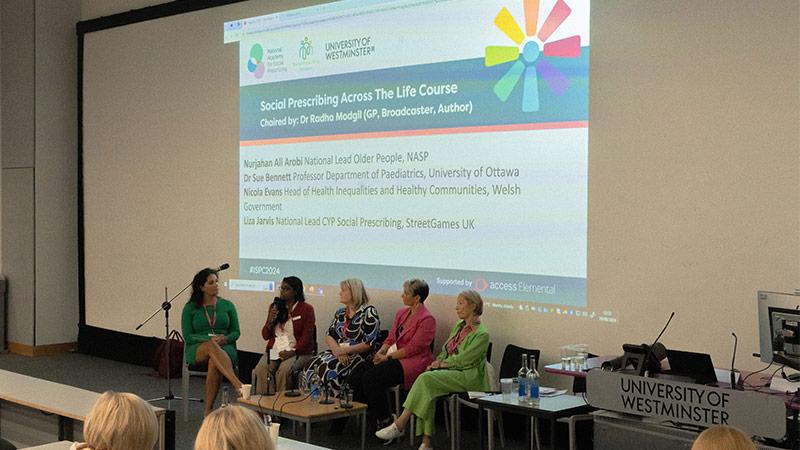On 19-20 June, the University of Westminster hosted the fifth annual International Social Prescribing Conference (ISPC) which was convened by the National Academy for Social Prescribing, the Social Prescribing Network and the University. This event focused on innovation in social prescribing, while addressing a variety of topics in sessions like Supporting the Workforce and The Future of Social Prescribing.

The event took place on Marylebone Campus over two days, where a remarkable line-up of speakers and panellists, as well as a wide range of leaders, practitioners and academics hosted many sessions and workshops. More than 60 speakers participated, focusing on evidence, research and innovation in social prescribing in England and across the world. Keynote speakers included Cormac Russell, who spoke about the importance of empowering communities to take the lead when it comes to health creation, and Sir Michael Marmot, who talked passionately about the increase in health inequalities and the need to address this.
The sessions hosted were focusing on innovation across arts, nature, heritage, physical and digital activity, social prescribing for children and young people, tackling health inequalities around the world, supporting the workforce, breaking out of primary care: whole system approaches, evidence and evaluation, health inequalities and major conditions, and lastly, the future of social prescribing.
There were also presentations about social prescribing projects across the world, including schemes in Singapore, Hong Kong, Germany and Ireland. Delegates took part in a range of activities, including a demonstration of the ENO breathe programme, a laughter yoga session, and a Badge Café hosted by the University of Westminster’s Soho Poly Theatre. At the end of the first day, the awards recognised link workers, community groups and inspiring projects nationally and internationally.
The conference was sponsored by Access Elemental, a social prescribing software designed for the use of General Practitioners and other frontline healthcare professionals to refer patients to a Social Prescribing Link Worker, Care Coordinator or a Health Coach.
Senior Lecturer in Life Sciences at Westminster and member of the Centre for Resilience (CfR) Justin Haroun was closely involved in organising this event. He said: “As a university, we have a clear focus on health and wellbeing with research centres in Optimal Health, Nutraceuticals, CfR and the Institute of Healthy Urban Living. Convening the Social Prescribing conference brought together rich and diverse expertise, innovation, practice and evidence. It was a festival of active hope for healthier communities and society. The ideas, connections and practices that were shared during those two inspiring conference days will continue to grow, having a real impact on people’s lives and community thriving.”
This event directly contributes to the United Nations Sustainable Development Goal (SDG) 3: Good Health and Wellbeing. Since 2019, the University of Westminster has used the SDGs holistically to frame strategic decisions to help students and colleagues fulfil their potential and contribute to a more sustainable, equitable and healthier society.
Read more about the University’s work on widening access to social prescribing.








